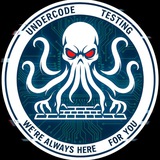Forwarded from DailyCVE
🔵SQL injection vulnerability exists in cloud intelligent book management platform
(DC: 251-2021)
https://dailycve.com/sql-injection-vulnerability-exists-cloud-intelligent-book-management-platform
(DC: 251-2021)
https://dailycve.com/sql-injection-vulnerability-exists-cloud-intelligent-book-management-platform
Dailycve
SQL injection vulnerability exists in cloud intelligent book management platform | CVE
Details:
A new wave of library cluster management systems, recently built according to the existing building specifications of the general cluster and the branch libraries, is the cloud intelligent book management framework.
The smart cloud book management…
Forwarded from UNDERCODE NEWS
For the "battery gate" speed limit incident on iPhone, Apple is subject again to European class action.
#International
#International
Forwarded from UNDERCODE NEWS
Fresh patent exposure for Microsoft: to use personal details to build a robot for the automated rebirth of dead.
#Technologies
#Technologies
▁ ▂ ▄ U𝕟𝔻Ⓔ𝐫Ć𝔬𝓓ⓔ ▄ ▂ ▁
🦑Creating bash script for multiple remote logins :
» create a script to help copy the public key to multiple remote Linux hosts.
# vim ~ / .bin / ssh-copy.sh
Copy and paste the following code into the file (replace the following variables accordingly USER_NAME is the username to connect, HOST_FILE is the file containing the list of hostnames or IP addresses, and ERROR_FILE is the file to store any errors from the ssh command).
#! / bin / bash
USER_NAME = "root"
HOST_FILE = "/ root / hosts"
ERROR_FILE = "/ tmp / ssh-copy_error.txt"
PUBLIC_KEY_FILE = "$ 1"
if [! -f $ PUBLIC_KEY_FILE]; then
echo "File '$ PUBLIC_KEY_FILE' not found!"
exit 1
fi
if [! -f $ HOST_FILE]; then
echo "File '$ HOST_FILE' not found!"
exit 2
fi
for IP in
ssh-copy-id -i $ PUBLIC_KEY_FILE $ USER_NAME @ $ IP 2> $ ERROR_FILE
RESULT = $?
if [$ RESULT -eq 0]; then
echo ""
echo "Public key copied to $ IP successfully"
echo ""
else
echo "$ (cat $ ERROR_FILE)"
echo
exit 3
fi
echo ""
done
Save the file and close it.
Then make the script executable with the chmod command, as follows:
# chmod + x ssh-copy.sh
Now run the ssh-copy.sh script and provide your public key file as the first argument as shown below:
# ./ssh-copy.sh /root/.ssh/prod-rsa.pub
Then use ssh-agent to manage your keys, which stores your decrypted private key in memory and uses it to authenticate logins.
After starting ssh-agent add your private key to it like this:
# eval "$ (ssh-agent -s)"
# ssh-add ~ / .ssh / prod_rsa
Login to remote Linux server without password
You can now log into any of your remote hosts without entering a password to authenticate the SSH user.
This way you can automate cross-server processes.
# ssh root@10.2.xy
(be smart & don't copy our tips !|)_
▁ ▂ ▄ U𝕟𝔻Ⓔ𝐫Ć𝔬𝓓ⓔ ▄ ▂ ▁
🦑Creating bash script for multiple remote logins :
» create a script to help copy the public key to multiple remote Linux hosts.
# vim ~ / .bin / ssh-copy.sh
Copy and paste the following code into the file (replace the following variables accordingly USER_NAME is the username to connect, HOST_FILE is the file containing the list of hostnames or IP addresses, and ERROR_FILE is the file to store any errors from the ssh command).
#! / bin / bash
USER_NAME = "root"
HOST_FILE = "/ root / hosts"
ERROR_FILE = "/ tmp / ssh-copy_error.txt"
PUBLIC_KEY_FILE = "$ 1"
if [! -f $ PUBLIC_KEY_FILE]; then
echo "File '$ PUBLIC_KEY_FILE' not found!"
exit 1
fi
if [! -f $ HOST_FILE]; then
echo "File '$ HOST_FILE' not found!"
exit 2
fi
for IP in
cat $ HOST_FILE; dossh-copy-id -i $ PUBLIC_KEY_FILE $ USER_NAME @ $ IP 2> $ ERROR_FILE
RESULT = $?
if [$ RESULT -eq 0]; then
echo ""
echo "Public key copied to $ IP successfully"
echo ""
else
echo "$ (cat $ ERROR_FILE)"
echo
exit 3
fi
echo ""
done
Save the file and close it.
Then make the script executable with the chmod command, as follows:
# chmod + x ssh-copy.sh
Now run the ssh-copy.sh script and provide your public key file as the first argument as shown below:
# ./ssh-copy.sh /root/.ssh/prod-rsa.pub
Then use ssh-agent to manage your keys, which stores your decrypted private key in memory and uses it to authenticate logins.
After starting ssh-agent add your private key to it like this:
# eval "$ (ssh-agent -s)"
# ssh-add ~ / .ssh / prod_rsa
Login to remote Linux server without password
You can now log into any of your remote hosts without entering a password to authenticate the SSH user.
This way you can automate cross-server processes.
# ssh root@10.2.xy
(be smart & don't copy our tips !|)_
▁ ▂ ▄ U𝕟𝔻Ⓔ𝐫Ć𝔬𝓓ⓔ ▄ ▂ ▁
